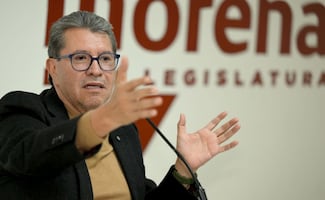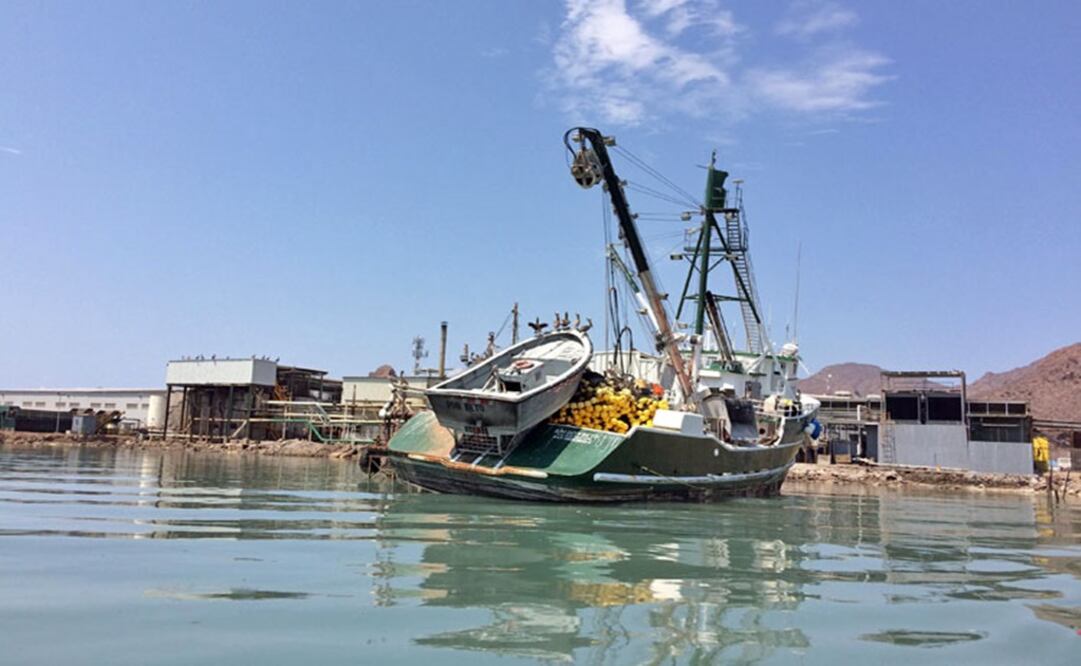Más Información

Monreal señala que errores de Morena afectan directamente a Sheinbaum; advierte fuertes disputas internas

Claves de la nueva reforma laboral paulatina de 40 horas; ¿patrones podrán descontarte salario?, aquí te contamos

Continúa baja de Vicealmirante Roberto de la Marina tras acusación de liderar red de huachicol; juez niega amparo

Noroña se lanza contra Díaz Ayuso tras dichos sobre México; quisieran en Madrid tener a Sheinbaum como gobernante, responde

Felipe Calderón acusa “negligencia criminal” por brote de sarampión; “crisis pudo evitarse”, asegura bancada del PAN

Violencia en Sinaloa se intensifica; mineros desaparecidos, fosas clandestinas y secuestros encienden alertas
Leer en español
Ernesto Ruffo Appel
, who belongs to a family of fishermen, is only a few days away from finishing his term as Head of the Senate Committee on Fisheries and he assures he will not leave that position without enlisting each and every debt left by the administrations of Mexico’s National Aquaculture and Fishing Commission ( CONAPESCA ) and the Ministry of Agriculture, Livestock, Rural Development, Fisheries and Food ( SAGARPA ).
The distribution of subsidies tops the list, Ruffo affirms in an interview with EL UNIVERSAL , adding that the distribution has been controlled by the country’s Executive Branch without a sustainable application (economic, environmental, and social).

Inciativa
dataMares
, an alliance between scientists and journalists at EL UNIVERSAL, revealed an expenditure in the sector amounting to more than MXN$ 7 billion in the 2008-2015 period, of which 38% were destined to "bad and ugly," fishing subsidies , according to the classification of international economists.
"It's terrible," Ruffo says regarding the distribution.
Ruffo Appel, the only fishing official who agreed to an interview about the investigation, makes a six-year recount of the relationship with Commissioner Mario Aguilar and former Secretary José Calzada: “ In absentia. " The former governor of Baja California also accuses the omission of a regulation in the Fisheries Law, resulting in " the alibi " for corruption.
Thus, he leaves two initiatives in his legislative legacy: the National Platform for Permit and Concession Tracking along with the Certified Discharge Center for Fisheries and Aquaculture .
What is the importance of the fishing sector?
It is a source of food for the nation and it is an economic activity for many Mexicans. However, the administration of the resources has been evolving in an erratic and chaotic manner. Undoubtedly, we must navigate towards sustainability through both transparency and civic participation of fishermen, since the basic form of organization is located in Mexico City and there isn’t any interest in sustainability nor in transparency, but rather a vision of political control.
Regarding the process in the Senate, how many initiatives were articulated and how many were stopped?
The reality is that very little has been articulated, but those rather obvious initiatives. For instance, the Discharge Center initiative took three years and it was approved at a voting juncture late at night, as there were other relevant things that the ruling Institutional Revolutionary Party ( PRI ) wanted. Members of the National Action Party ( PAN ) Fisheries Commission assist, yet PRI and Green Party ( PVEM ) members do not attend, so we do not have quorum.
Yet they
go
, for instance, to the 2018 World Ocean Summit held in March in Cancun to show off, right?
They go to attend a series of political tourism issues, as I call it, and it's regrettable. Thus, I can say that there is little responsibility, and I say this after spending almost six years in the Committee on Fisheries.
According to specialists in the research we conducted along with InciativadataMares, subsidies in the fishing sector have not been oriented nor applied efficiently.
What would you say in that regard?
Unfortunately, subsidies have not been managed, as they are channeled through loyal political groups and the one managing the public resources. The necessity of the requirement is not distributed nor attended from the point of view of the capture and process, but rather from political loyalty, a pattern found in fishing, agriculture, and even manufacturing. Overall, it is a political system.
There are types of subsidies that could improve fishing infrastructure to capitalize the sector with technological development, however, the subsidies are mainly for fuel increasing operational capacity, right?
The public policy [of subsidies] is not for the sustainability of fishing and consequently is not for fishermen. It is for political control and the benefit of interests that in many cases are protected by corrupt processes. That is the reason behind the idea of transferring the center of the decision to the assembly of fishermen of a specific region, and that is why I speak of fishermen citizens, then again another challenge.
What about internal control?
There may be fishing chiefs and other positions. There has to be a real dynamic of participation that promotes citizen progress and an authority that is really looking for public policies.
How to give continuity to projects such as the Transparency Platform and the Discharge Center?
It all resides in order, an order that comes from rules, written codes of conduct in institutions. For instance, the basic cell of the fishing order would be the Certified Discharge Center, followed by the accommodation of communities, thus it should be recognized and incorporated in the monitoring plan of the fishing activity.
How was your work with the Fisheries Commissioner?
It has been a relationship in absentia as I have sought the link with the Executive Branch. I have tried it, yet I have only had the attention when it comes to public events of a national and international nature where the Legislative Branch is required through its commissioner, but when it comes to the follow up on certain issues that is another story. Thus, the initiative intends to force the Executive Branch through the law, through SAGARPA and its commissioner, to transparently state the status of the negotiations so everybody would know about the management of the resources and whether the assignment is transparent or partial, in case it favors someone to the detriment of others.
What is your diagnosis of the administrations of the commissioner and the former secretary of SAGARPA?
A lot can be done regarding sustainability, however, this is not the intention that I perceived in the commissioner nor the secretary. I rather saw a political interest to reinforce the political support of the government. I'm sorry to say what I'm saying, but time and resources have been throwing away.
In this administration, the nonexistence of a regulation to the Fisheries Law was harshly criticized, right?
Repeatedly! The law was published in 2007 and to date, we are working with regulations of another law. How is it possible, you may ask. Well, because in the absence of a regulation, another regulation applies, yet it is not subject to something that you can legally challenge, that's why there is no regulation, an absolute alibi for corruption.
What would you say regarding the distribution of subsidies?
It's awful!
Would you say that fishing is absent in the agendas of the presidential candidates?
The subject is absent. It is not even on the political platforms of any party. It is regrettable, but it is an indication of the attention and interest of the different political groups. They are engaged in more remarkable challenges or challenges that interest bigger groups, which represent more votes.
*This article is part of the science journalism project promoted by Iniciativa DataMares (datamares.org), which seeks transparency, dissemination, and understanding of information for decision-making processes regarding the sustainability and conservation of the natural resources of the country.
Article, photography, and video: Enrique Alvarado, Alejandro Melgoza and Andrés M. Estrada
Project Coordinator: Raquel López-Sagástegui
Director of the Marine Program of the Gulf of California: Catalina López-Sagástegui
sg
Noticias según tus intereses
[Publicidad]
[Publicidad]








